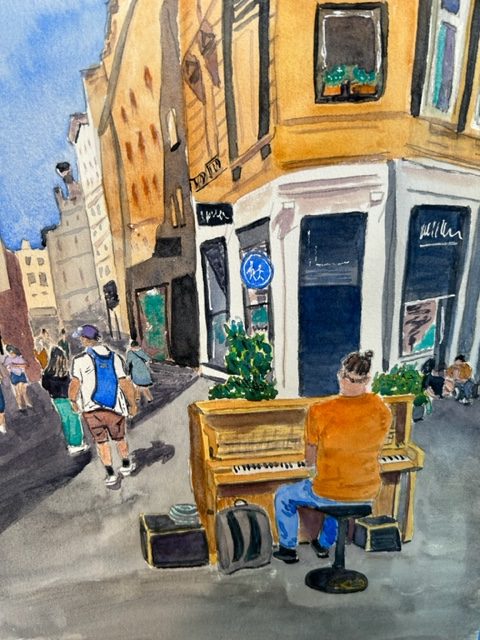
Many advancements come from adversity when you think about it. When things are going poorly – either culturally, militarily, economically or at work — we tend to focus on the negative. But with hindsight, it becomes clear that a hard time often jumpstarts a new, more positive path. In many cases, exponential versus incremental progress is the outcome.
World War
War is destructive and devastating. It’s also often a catalyst for constructive change.
During World War I, fighting bacterial infection, a huge source of deaths, became easier with the greatly expanded use of penicillin. Airplane technology also accelerated sharply during this period, making air travel more available and affordable years earlier than would have occurred otherwise.
Women’s clothing became vastly more wearable and less confining when cloth for domestic use was rationed and dedicated to the war effort. Women’s dresses became shorter and less bulky, meaning women could be more comfortable and agile. Following WWI and the 1918 flu pandemic, attitudes about women’s dress and social comportment became even more relaxed during the 1920’s jazz age.
WWII led to greater acceptance of women in the workforce as so many men were fighting overseas. Even though women were discharged back to their housewife roles when the men came home, it became more accepted that many professions didn’t require men’s strength and may benefit from female-oriented attributes.
The Depression
Even the Depression that began in 1929 and into the 1930’s led to positive change. When visiting national parks and other areas, my family and I have marveled at the once-in-a-lifetime public works projects (ex. roads, bridges, landscaping, buildings) built by the Civilian Conservation Corps and other New Deal programs. It is doubtful that many of these supplementary projects would have secured funding had it not been for the need for massive reemployment. Social Security also came out of this period, as did the 40-hour workweek and minimum wage.
I am fascinated by a series of programs that fell under the Works Progress Administration, which subsidized unemployed artists, musicians and writers. In addition to the wonderful art created under the WPA, we continue to benefit from the historical documentation by writers and photographers of our regional differences, which became much less distinctive once TV (and later the telecommunication age) became so prominent. One example is the WPA’s America Eats Project, in which writers were sent around the country to chronicle what Americans bought, ate, cooked and thought about food during the 1930’s. This work is now available via the What America Ate project. Little of this would have happened without the ravages wrought by the Depression.
Covid-19
While no one would ever want to experience a global pandemic again, it has ushered in valuable gains that might have otherwise taken years or decades to achieve.
Zoom, Slack, Teams and other electronic applications have allowed us to work and connect remotely, essentially changing the nature of work and play for so many. We no longer expect that workforce productivity can only happen at the office.
A compelling transformation since covid is the proliferation of car-free streets. Many of our roadways turned into streeteries that enabled us to meet and eat communally in a safe way. While there are those that oppose banning cars, many of us love having greater access to pedestrian and bike-friendly outdoor public spaces, even if it means having to find parking farther afield. Urban planners have learned a ton from this unplanned experiment.
Our downtowns now need to be reimagined because of the change in work routines. The next innovation is retrofitting downtown commercial buildings for residential use, inviting more into city centers and hopefully in a more affordable way. Such zoning changes would have been unthinkable a few years ago.
Covid has led to greater integration of our personal and work lives. It became normal to see kids and dogs during virtual meetings. We now acknowledge and accept that we all have families and obligations external to the workforce. So many are exploring new locales where they can rent an air bnb and work remotely. Not having to commute can feel like a windfall of reclaimed hours each day.
Like others, I’ve become much more attuned to nature. Take birds, which I barely paid attention to before. Since using our deck like never before, I’ve become enchanted with birds and their singing that often accompanies our outdoor meals.
It’s impossible to anticipate how much our society will be affected by covid over the coming years, decades and even centuries. When my husband and I went to Norway in 2019, we were struck by the impact that the 1340’s Bubonic Plague continues to have on Norway’s structure. Norway lost up to 70% of its population, and most of its nobility, leaving it unable to self-govern. For years until it became a sovereign country in 1905, it was governed either by Denmark or Sweden. Today, the legacy of the Black Plague continues in its small population and its fiercely protected independence. Although it is close to Europe and is a member of NATO (and OPEC), it is intentionally not a member of either the EU or the Eurozone. We have not been hit as hard as Norway was during the Middle Ages, but we are not immune to our pandemic’s lasting impacts.
Work Angst
Many of us have experienced a horrible work ordeal that drove us to search for something else. In the moment, it’s hard to see anything beneficial coming out of our miserable situation, but in most cases, that is exactly what happens. We overcome our typical state of inertia, enter self-examination mode and push ourselves to find a way out. Although no one welcomes work angst, it can be a useful elixir.
History as perspective
I don’t mean to paint an overly rosy view of negative events. It’s hard to find light from the horrible spate of mass shootings, or the Holocaust, or so many racially-or-gender-or religiously-motivated crimes. Covid has shattered lives, disrupted education, and left us with a deep mental health crisis. As noted above in Norway’s example, it will affect us for years and maybe centuries. Our political and social division, and the authoritarian tendencies we are experiencing, will lead to certain change, and we can only hope that this period will in the end lead to positive change.
While there are many reasons to despair, what helps me manage discomfort is looking back. History provides perspective and lessons, much of which proves positive in retrospect. It can be a salve for dealing with difficult times. What’s your perspective on turning negatives into positives?
Related Recommendations:
Making U.S. cities more pedestrian-friendly from KERA’s Think podcast. This was the inspiration for this blogpost.
Take a look at this amazing migratory bird website, in which you can see fascinating information about migrating birds in your county each night Spring through Fall.
New Approaches to Polarization from Katie Couric’s Next Question podcast. This is a fascinating conversation with a Mexican immigrant/son of a Holocaust survivor and philanthropist/founder of Kind bars on overcoming toxic polarization.


Linda
A very general comment is that any major event, positive or negative, leads people and societies to rethink how life has been conducted. To use the now over-used phrase to ‘think outside the box,’ that is exactly what happens. Economies are restructured, and class divisions are overturned, such as happened with the World Wars, the Civil Wars in America and England, and the Plague. There are always ‘winners’ and ‘losers,’ but society itself moves forward.
Wow! Once again, I found myself invigorated by this blog piece! The historical insights were illuminating.
After reading so much of the demise of our urban cities post Covid, especially San Francisco, I am now anxiously awaiting and fascinated to see the innovations that our urban planners and city officials will embark upon. Rather than joining the chorus of the doomsayer, I will now join the “constructive change ” is around the corner team. Thank you for the enlightenment!
Excellent and encouraging piece Linda. It is so easy to get down in the dumps about our inability to come together to do the right things. It’s depressing when we see the political divide expand instead of shrink. But you are correct, that we need to take a pause and reflect back, and be amazed at how we can address overwhelming issues. These are the lessons of history. By the way, love the watercolor of Amsterdam which we just returned from. You captured it perfectly!